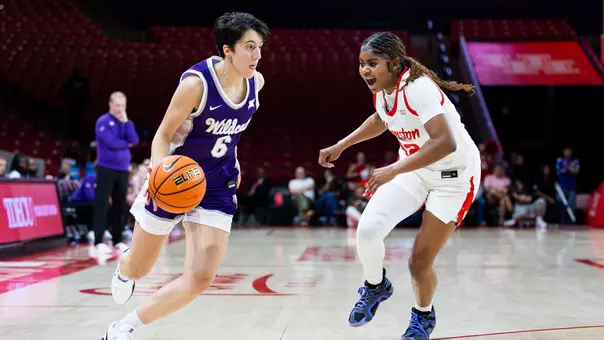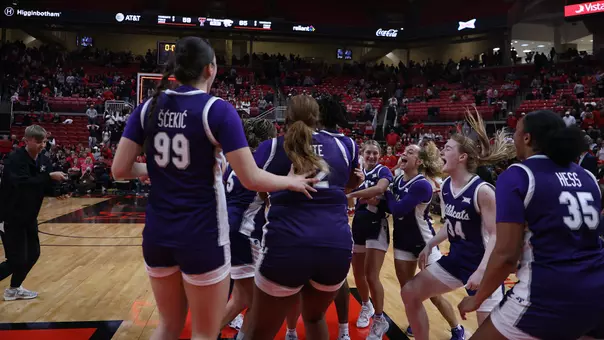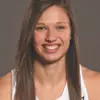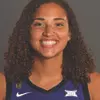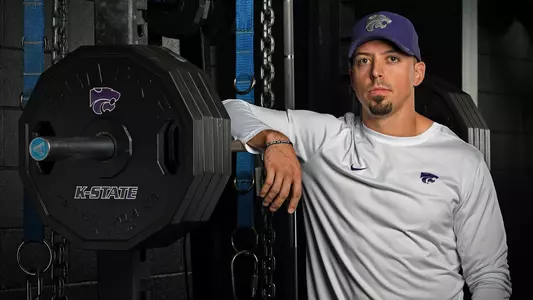
SE: ‘The Biggest Impact:’ AJ Kloss Brings More than Meets the Eye as Strength and Conditioning Coach
Nov 06, 2019 | Women's Basketball, Tennis
By Corbin McGuire
AJ Kloss looks like a strength and conditioning coach — muscular, naturally serious facial expressions, claps a lot, usually in workout clothes, sometimes sweaty from throwing weights, occasionally carrying a Bang energy drink in a koozie, a recently shaved head.
His presence screams his title. He needs no nametag. But there is more than meets the eye with Kloss, who works with women's basketball and tennis at K-State. His impact goes beyond the rectangular room he monitors and the numbers he tries to improve.
"Individually, he had probably the biggest impact in my four years here of any other person that I ever encountered, both mentally and physically," former K-State women's basketball player Kayla Goth said of Kloss, in his sixth season at K-State.
"Not only is he great at what he does with strength and conditioning, overseeing and building a plan individually for all our student-athletes," K-State tennis head coach Jordan Smith said, "but he also does a great job of being there for them and building relationships."
Added K-State women's basketball head coach Jeff Mittie: "The one thing AJ has really done a great job of is it's not just the strength and conditioning part, it's the mental toughness part, it's the organization part, it's the commitment part to doing things right. All of the above. There's so much more than the strength coach that they used to be 10 years ago. That's an area he excels in."
It just took Kloss some time to find his calling, though he started on the right track. Sort of.
***
Kloss described his younger self as "kind of a jock, kind of a meathead." He started lifting weights in sixth grade, "which is ridiculous…I totally realize that now," Kloss admitted. He even drank raw eggs before getting to school before any other student to work out on "old school machines" behind his school gymnasium bleachers.
"It was one of those places where it was dingy, everything was corroded metal. It had this metallic scent, so to this day I can walk into an old gym and the memories," Kloss said, drifting back in time. "That's kind of where it all began for me."
He continued to lift and found the idea of sport performance fascinating, but he never really knew it could be a career.
"At that point I was so tip of the iceberg," he said. "I didn't know anything."
After high school, Kloss pursued a career as a paramedic. After about 18 months, he changed course. Still, he knew he wanted to work with people. He wanted to help people. He just didn't know what that looked like.
Like some of his friends, Kloss went to the University of Iowa to figure it out. And, like a good percentage of college students, it did not happen overnight.
"I was a little bit directionless for a while," Kloss said. "I kind of got lost in the college years."
In the tail end of his college career, Kloss got involved with strength and conditioning coaching through Phil Johnson, then a teaching assistant in one of Kloss' general education courses. Johnson and Kloss, who still keep in touch, frequently used class time to discuss "out of the box ideas about performance training." Eventually Johnson, who coached at a small high school, convinced Kloss to come intern in its weightlifting program.
"I just loved it that first time," Kloss said. "The way that the kids would respond to this individual was super cool. They weren't just there to lift weights. They were there to better themselves, overall. I kind of saw that, and I thought this would be really cool to do in a professional capacity."
Kloss interned there until he graduated from Iowa in 2013. Next, he landed in the Iowa athletics department as an intern in their strength and conditioning staff. Soon, he was running its intern department, all while selling sporting goods at a local Scheels and serving as a bouncer at a bar.
"I was a high-strung cat in those days," Kloss laughed. "I was on edge. A lot of caffeine in those days. But it was super cool."
Another 18 months went by and it was time for Kloss to move to something else. This time, he needed a full-time, paying gig. He had some potential opportunities on the horizon, K-State being one of them. He just needed to get accepted into graduate school. He still recalls a "50-something long" email chain with now-Deputy AD/Senior Woman Administrator Jill Shields throughout this process.
"She advocated on me in the academia world," Kloss said, "and she really helped me out."
Still, Kloss did not find out he was admitted at K-State until he was en route to Southern Illinois for a prospective job. Jimmy Price, then the men's basketball strength and conditioning coach, called Kloss to tell him, and also ask if he could be in Manhattan in 48 hours.
"I'm literally pulled over on the side of the highway," Kloss said, "and I'm, like, 'Yeah, yeah, I'll do it.'"
So, he promptly drove his Pontiac Grand Prix — since retired — back to his home, "stuffed it to the gills and just drove west on I-80 until Nebraska and then cut down."
A Chicago native, Kloss had never been to Kansas before. As he drove by the "Welcome to the Flint Hills" sign, he remembered thinking, "What am I doing?" His uncertainty did not last long.
"K-State immediately was just a really cool place," he said. "I worked with football and both basketball teams during that time. I was able to get a master's degree (in counseling and student affairs in 2016), and the rest is kind of history."

***
Beyond youth league, Kloss has never played competitive basketball. He never even reached that point in tennis.
"So, I work with two sports that I'm no good at, which is kind of ironic," Kloss said, "but that kind of allows me a completely different lens when I'm looking at those sports because I know what those movements feel like, but I'm also looking at it more from a scientific standpoint."
Which Kloss loves. He's a learner.
"I would say my process of understanding the science is eternal," he said. "It's never ending."
As is the rotation of books in his office at the Ice Family Basketball Center, filled with material relevant to his field. It's only the tip of the iceberg, too. There's another stash at home. One day, he hopes to get his doctorate.
"He's a lifelong learner. He's got a lot of interests. He researches a lot. If I give him a project or an idea, he's one that jumps all over that kind of thought process," Mittie said. "What I've liked about him since he's been here is his ability to take his area and apply to how it can be helpful to us on the floor. I've seen him grow in that area."
To get a better idea of what the tennis program needed from him, Kloss went straight to the source. He asked Smith, then an assistant coach, to take him out for a practice — men's basketball strength and conditioning coach Ben O'Donnell also joined. Smith went through the team's typical drills, making sure to touch on every physical aspect of the sport.
"I probably had them out for 30 minutes to an hour and was, like, 'Hey, this is all the stuff we're going to do.' It was good for him because he could be, like, 'Now I see what kind of muscles I'm using,'" Smith said. "Things like explosiveness and everything they would need to do and do well on a tennis court, he was actually able to see that firsthand. That was really cool that he was, like, 'Throw me in there. Show me what I need,' and from then on it was learning, research, studying, coming to our practices.
"He's come to our matches and seen them in very competitive environments, seen where the breakdowns may be and planned accordingly. That's really cool that someone's that thorough and just invested."
Kloss countered that being invested is only half the battle. You need coaches, colleagues and support staff willing to work alongside you in the pursuit to improve student-athletes. From Day One, he said he's had that at K-State.
Mittie and Smith have given him freedom and autonomy in his area with their teams. Their support and trust, Kloss said, is "invaluable as a strength and conditioning coach."
Women's basketball assistant coach Chris Carr has helped bridge the gap between the intricacies on the court and the needs Kloss can help fill in the weight room.
"(He) has been a lot of help to me with understanding offensive and defensive schemes and patterns and positions our student-athletes need to be strong and robust in," Kloss said. "He takes time to break things down for me and it's helpful when developing a training program."
Kloss also mentioned people like O'Donnell, along with Corey Meredith and Evan Rapp on the football strength and conditioning staff, respective men's and women's basketball athletic trainers Luke Sauber and Becca Fitzgerald, and assistant sports dietician/nutritionist Katie LeMair as essential pieces to his job.
"I've been able to have a lot of success in my area of getting kids to perform at higher levels than they probably imagined possible, but I couldn't do that without the resources I have here at Kansas State," he said. "The training is super important, but the recovery is just as important. So, if they don't have Becca, Katie to help them out with recovery modalities, help them out with their diet — quite literally how they're fueling their vehicle — none of the stuff I do with them is really even possible. If I had to shoulder those responsibilities, I would not be able to get as acute, as specific, as intricate in my areas of what I do.
"My story here has been aided by a lot of people, and I'm extraordinarily grateful that they've been part of it, and they've allowed me to do what I've been able to do here at this university."

***
Goth, a First Team All-Big 12 point guard last season, compares Kloss to the backboard in basketball.
He's always there. He never changes. He's forgiving, to a certain point. The best players learn to use him as an asset.
"Obviously, I wouldn't have gotten through all my injuries without him," Goth, who came to K-State off a torn ACL and injured her shoulder as a sophomore, said. "He also was always that sounding board that I could go to and was very levelheaded. I always knew what I was going to get from him."
When her attitude went south as a junior, Goth said Kloss is the reason she pulled out of it. Where others could not reach her, he could.
"I was really, really frustrated, and AJ was the only one who could actually sit me down and be, like, 'Hey, you're not doing the right things here. It's not going well. People are not responding well to your leadership style right now,'" she said. "He was just very straightforward about it, and it was one of those things where I wasn't offended at all. Just the respect that both he has for us and we have for him is second to none."
That respect starts with Kloss' consistency. It's intentional. Kloss asks the same of his players, with how they work, how they treat the practice facility and their locker room. If he instills nothing else in them in their four or five years, he wants them to leave with a stronger self-discipline.
"They can't leave any trash in the gym. All the balls need to be racked when they go home. In the locker room, I'll do random walk throughs once a week, and the locker room has standards — one pair of shoes under the chair, no exposed clothing in the locker," Kloss said. "All these kinds of things that seems a little bit militant, and it probably is, but I really believe that discipline breeds success.
"When you get sloppy with things and you're not attentive to details, you start to deteriorate the bigger picture. If I can do a good enough job of making them check all these little boxes, then the bigger picture is going to look a lot better, and some of that discipline is going to bleed into other areas of their life."
Kloss, as he's well aware, can come off as intimidating, at first.
"Absolutely," redshirt freshman forward Ayoka Lee laughed.
In time, student-athletes learn who he is and what he's about. Namely, them and their future.
"He's always the first one to say, 'If you want to do extra workouts, I'm available,'" tennis junior Anna Turco said, "and he's always trying to find times to get you in to let you improve as an athlete.
"AJ's literally amazing. I'm so thankful he's our strength coach," Lee, who worked through an ACL recovery last season, added. "There's never a day when he's going to expect less of you, but he's definitely going to help you get to where you need to be."
These types of revelations, Kloss said, only make his job easier. And more powerful. If people know you care about them, he said, motivation never touches fear and centers on love. From here, his impact can carry well past any athletic or physical achievement.
"When they graduate and when they leave, the wedding invitations probably speak for themselves," Kloss said, opening up his desk drawer full of thank you cards and wedding invitations. "I think, if you're in it for the right reasons, every strength coach probably has something like this, these mementos, reminders of, 'Hey, you're actually helping some kids out.' That's what's really cool about the profession.
"Yeah, I'm really obsessed with sport performance, making gains and getting big and all that kind of stuff. It's really cool, but ultimately that's the stuff that truly matters. I tell them that all the time."
AJ Kloss looks like a strength and conditioning coach — muscular, naturally serious facial expressions, claps a lot, usually in workout clothes, sometimes sweaty from throwing weights, occasionally carrying a Bang energy drink in a koozie, a recently shaved head.
His presence screams his title. He needs no nametag. But there is more than meets the eye with Kloss, who works with women's basketball and tennis at K-State. His impact goes beyond the rectangular room he monitors and the numbers he tries to improve.
"Individually, he had probably the biggest impact in my four years here of any other person that I ever encountered, both mentally and physically," former K-State women's basketball player Kayla Goth said of Kloss, in his sixth season at K-State.
"Not only is he great at what he does with strength and conditioning, overseeing and building a plan individually for all our student-athletes," K-State tennis head coach Jordan Smith said, "but he also does a great job of being there for them and building relationships."
Added K-State women's basketball head coach Jeff Mittie: "The one thing AJ has really done a great job of is it's not just the strength and conditioning part, it's the mental toughness part, it's the organization part, it's the commitment part to doing things right. All of the above. There's so much more than the strength coach that they used to be 10 years ago. That's an area he excels in."
It just took Kloss some time to find his calling, though he started on the right track. Sort of.
***
Kloss described his younger self as "kind of a jock, kind of a meathead." He started lifting weights in sixth grade, "which is ridiculous…I totally realize that now," Kloss admitted. He even drank raw eggs before getting to school before any other student to work out on "old school machines" behind his school gymnasium bleachers.
"It was one of those places where it was dingy, everything was corroded metal. It had this metallic scent, so to this day I can walk into an old gym and the memories," Kloss said, drifting back in time. "That's kind of where it all began for me."
He continued to lift and found the idea of sport performance fascinating, but he never really knew it could be a career.
"At that point I was so tip of the iceberg," he said. "I didn't know anything."
After high school, Kloss pursued a career as a paramedic. After about 18 months, he changed course. Still, he knew he wanted to work with people. He wanted to help people. He just didn't know what that looked like.
Like some of his friends, Kloss went to the University of Iowa to figure it out. And, like a good percentage of college students, it did not happen overnight.
"I was a little bit directionless for a while," Kloss said. "I kind of got lost in the college years."
In the tail end of his college career, Kloss got involved with strength and conditioning coaching through Phil Johnson, then a teaching assistant in one of Kloss' general education courses. Johnson and Kloss, who still keep in touch, frequently used class time to discuss "out of the box ideas about performance training." Eventually Johnson, who coached at a small high school, convinced Kloss to come intern in its weightlifting program.
"I just loved it that first time," Kloss said. "The way that the kids would respond to this individual was super cool. They weren't just there to lift weights. They were there to better themselves, overall. I kind of saw that, and I thought this would be really cool to do in a professional capacity."
Kloss interned there until he graduated from Iowa in 2013. Next, he landed in the Iowa athletics department as an intern in their strength and conditioning staff. Soon, he was running its intern department, all while selling sporting goods at a local Scheels and serving as a bouncer at a bar.
"I was a high-strung cat in those days," Kloss laughed. "I was on edge. A lot of caffeine in those days. But it was super cool."
Another 18 months went by and it was time for Kloss to move to something else. This time, he needed a full-time, paying gig. He had some potential opportunities on the horizon, K-State being one of them. He just needed to get accepted into graduate school. He still recalls a "50-something long" email chain with now-Deputy AD/Senior Woman Administrator Jill Shields throughout this process.
"She advocated on me in the academia world," Kloss said, "and she really helped me out."
Still, Kloss did not find out he was admitted at K-State until he was en route to Southern Illinois for a prospective job. Jimmy Price, then the men's basketball strength and conditioning coach, called Kloss to tell him, and also ask if he could be in Manhattan in 48 hours.
"I'm literally pulled over on the side of the highway," Kloss said, "and I'm, like, 'Yeah, yeah, I'll do it.'"
So, he promptly drove his Pontiac Grand Prix — since retired — back to his home, "stuffed it to the gills and just drove west on I-80 until Nebraska and then cut down."
A Chicago native, Kloss had never been to Kansas before. As he drove by the "Welcome to the Flint Hills" sign, he remembered thinking, "What am I doing?" His uncertainty did not last long.
"K-State immediately was just a really cool place," he said. "I worked with football and both basketball teams during that time. I was able to get a master's degree (in counseling and student affairs in 2016), and the rest is kind of history."

***
Beyond youth league, Kloss has never played competitive basketball. He never even reached that point in tennis.
"So, I work with two sports that I'm no good at, which is kind of ironic," Kloss said, "but that kind of allows me a completely different lens when I'm looking at those sports because I know what those movements feel like, but I'm also looking at it more from a scientific standpoint."
Which Kloss loves. He's a learner.
"I would say my process of understanding the science is eternal," he said. "It's never ending."
As is the rotation of books in his office at the Ice Family Basketball Center, filled with material relevant to his field. It's only the tip of the iceberg, too. There's another stash at home. One day, he hopes to get his doctorate.
"He's a lifelong learner. He's got a lot of interests. He researches a lot. If I give him a project or an idea, he's one that jumps all over that kind of thought process," Mittie said. "What I've liked about him since he's been here is his ability to take his area and apply to how it can be helpful to us on the floor. I've seen him grow in that area."
To get a better idea of what the tennis program needed from him, Kloss went straight to the source. He asked Smith, then an assistant coach, to take him out for a practice — men's basketball strength and conditioning coach Ben O'Donnell also joined. Smith went through the team's typical drills, making sure to touch on every physical aspect of the sport.
"I probably had them out for 30 minutes to an hour and was, like, 'Hey, this is all the stuff we're going to do.' It was good for him because he could be, like, 'Now I see what kind of muscles I'm using,'" Smith said. "Things like explosiveness and everything they would need to do and do well on a tennis court, he was actually able to see that firsthand. That was really cool that he was, like, 'Throw me in there. Show me what I need,' and from then on it was learning, research, studying, coming to our practices.
"He's come to our matches and seen them in very competitive environments, seen where the breakdowns may be and planned accordingly. That's really cool that someone's that thorough and just invested."
Kloss countered that being invested is only half the battle. You need coaches, colleagues and support staff willing to work alongside you in the pursuit to improve student-athletes. From Day One, he said he's had that at K-State.
Mittie and Smith have given him freedom and autonomy in his area with their teams. Their support and trust, Kloss said, is "invaluable as a strength and conditioning coach."
Women's basketball assistant coach Chris Carr has helped bridge the gap between the intricacies on the court and the needs Kloss can help fill in the weight room.
"(He) has been a lot of help to me with understanding offensive and defensive schemes and patterns and positions our student-athletes need to be strong and robust in," Kloss said. "He takes time to break things down for me and it's helpful when developing a training program."
Kloss also mentioned people like O'Donnell, along with Corey Meredith and Evan Rapp on the football strength and conditioning staff, respective men's and women's basketball athletic trainers Luke Sauber and Becca Fitzgerald, and assistant sports dietician/nutritionist Katie LeMair as essential pieces to his job.
"I've been able to have a lot of success in my area of getting kids to perform at higher levels than they probably imagined possible, but I couldn't do that without the resources I have here at Kansas State," he said. "The training is super important, but the recovery is just as important. So, if they don't have Becca, Katie to help them out with recovery modalities, help them out with their diet — quite literally how they're fueling their vehicle — none of the stuff I do with them is really even possible. If I had to shoulder those responsibilities, I would not be able to get as acute, as specific, as intricate in my areas of what I do.
"My story here has been aided by a lot of people, and I'm extraordinarily grateful that they've been part of it, and they've allowed me to do what I've been able to do here at this university."

***
Goth, a First Team All-Big 12 point guard last season, compares Kloss to the backboard in basketball.
He's always there. He never changes. He's forgiving, to a certain point. The best players learn to use him as an asset.
"Obviously, I wouldn't have gotten through all my injuries without him," Goth, who came to K-State off a torn ACL and injured her shoulder as a sophomore, said. "He also was always that sounding board that I could go to and was very levelheaded. I always knew what I was going to get from him."
When her attitude went south as a junior, Goth said Kloss is the reason she pulled out of it. Where others could not reach her, he could.
"I was really, really frustrated, and AJ was the only one who could actually sit me down and be, like, 'Hey, you're not doing the right things here. It's not going well. People are not responding well to your leadership style right now,'" she said. "He was just very straightforward about it, and it was one of those things where I wasn't offended at all. Just the respect that both he has for us and we have for him is second to none."
That respect starts with Kloss' consistency. It's intentional. Kloss asks the same of his players, with how they work, how they treat the practice facility and their locker room. If he instills nothing else in them in their four or five years, he wants them to leave with a stronger self-discipline.
"They can't leave any trash in the gym. All the balls need to be racked when they go home. In the locker room, I'll do random walk throughs once a week, and the locker room has standards — one pair of shoes under the chair, no exposed clothing in the locker," Kloss said. "All these kinds of things that seems a little bit militant, and it probably is, but I really believe that discipline breeds success.
"When you get sloppy with things and you're not attentive to details, you start to deteriorate the bigger picture. If I can do a good enough job of making them check all these little boxes, then the bigger picture is going to look a lot better, and some of that discipline is going to bleed into other areas of their life."
Kloss, as he's well aware, can come off as intimidating, at first.
"Absolutely," redshirt freshman forward Ayoka Lee laughed.
In time, student-athletes learn who he is and what he's about. Namely, them and their future.
"He's always the first one to say, 'If you want to do extra workouts, I'm available,'" tennis junior Anna Turco said, "and he's always trying to find times to get you in to let you improve as an athlete.
"AJ's literally amazing. I'm so thankful he's our strength coach," Lee, who worked through an ACL recovery last season, added. "There's never a day when he's going to expect less of you, but he's definitely going to help you get to where you need to be."
These types of revelations, Kloss said, only make his job easier. And more powerful. If people know you care about them, he said, motivation never touches fear and centers on love. From here, his impact can carry well past any athletic or physical achievement.
"When they graduate and when they leave, the wedding invitations probably speak for themselves," Kloss said, opening up his desk drawer full of thank you cards and wedding invitations. "I think, if you're in it for the right reasons, every strength coach probably has something like this, these mementos, reminders of, 'Hey, you're actually helping some kids out.' That's what's really cool about the profession.
"Yeah, I'm really obsessed with sport performance, making gains and getting big and all that kind of stuff. It's really cool, but ultimately that's the stuff that truly matters. I tell them that all the time."
Players Mentioned
K-State Women's Basketball | Game Replay vs Utah - January 10, 2026
Monday, January 12
K-State Women's Basketball | Coach Mittie Press Conference vs Utah
Sunday, January 11
K-State Women's Basketball | Athletes Press Conference vs Utah
Sunday, January 11
K-State Women's Basketball | Game Highlights vs Utah
Sunday, January 11
